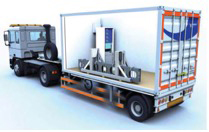 ESR13: Using truck sensors for road pavement performance investigation
ESR13: Using truck sensors for road pavement performance investigation
- Host: University of Nottingham (UNOTT)
- Address: NTEC, Pavement Research Building, United Kingdom
- Main Supervisor: Dr. Tony Parry and Dr. Luis Neves
- Fellow: Federico Perrotta
It has been known for many years that road surface evenness influences vehicle fuel consumption, with smoother roads significantly improving fuel efficiency (usual estimates of up to 5% compared to ‘rough’ roads). More recently, it has been claimed that pavement stiffness also influences fuel economy (with varying estimates of
What is less clear is the significance of these impacts on vehicle fleet fuel economy, under real driving conditions and at network level. This has recently gained more focus in the highway authority and research community as carbon foot-printing of road maintenance plans has gained importance. Modern trucks are fitted with many sensors as standard and used to inform decisions on maintenance and driver training requirements in large fleets.
However, much of the information produced could also be used in the measurement of how road condition influences performance in terms of vehicle operation. In particular, two research questions have not been sufficiently well answered: ‘what is the influence of road pavement roughness on truck fleet fuel consumption?’ and ‘what is the influence of road pavement stiffness on truck fleet fuel consumption?’
The research will provide answers to these questions to help prioritise pavement maintenance and design decisions with respect to user and environmental impacts.
In co-operation with Microlise Ltd, who collect and interpret location-referenced sensor data for truck fleet managers, the researcher will analyse truck fleet fuel consumption using data from a large number of trucks in everyday use (currently the UK fleet size sampled by the company is about 50000 trucks). TRL Ltd, experts in road condition measurement, will provide data, including evenness, stiffness and geometry, for the UK road network. The correlation between truck fleet fuel consumption and road condition for a large number of vehicles will be analysed across the network.
This project involves a secondment of some months to Microlise Ltd and also to TRL Ltd. In Microlise, the researcher will: (a) receive training in truck sensor data collection, in particular with reference to fuel consumption and associated factors such as dynamic axle loads and location referencing, and (b) gain exposure to truck manufacturers and truck fleet operators and understand their priorities with respect to fleet fuel consumption and control.
In TRL, the researcher will gain: (a) training in road condition measurements of various factors including evenness, stiffness and geometry, and (b) exposure to highway authorities and understand their priorities in the area of road maintenance planning. The ESR will build and deliver the database of condition measurements required for the research study.
- Federico Perrota – click to view profile
- Dr. Tony Parry – click to view profile
- Dr. Luis Neves – click to view profile
- Dr. Mohammad Mesgarpour
- Mr. Ian Dickinson
- Dr. Helen Viner
- Prof. Eugene OBrien – click to view profile
- Dr. Rasa Rementye-Prescott – click to view profile
You can follow blog and publications by ESR13 below.



